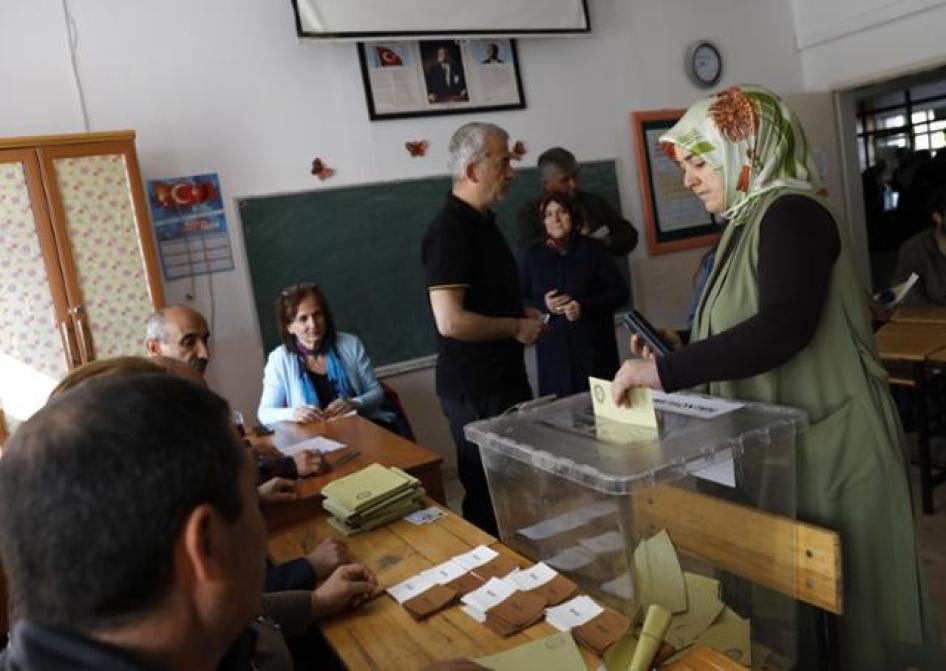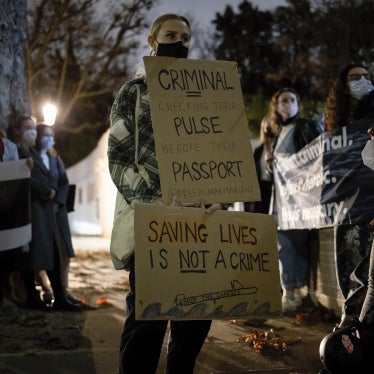(Istanbul) – Turkey’s government and president should reverse the decision to extend the state of emergency after winning the April 16, 2017 presidential referendum and end the wave of political repression unleashed in the months before the vote, Human Rights Watch said today.
With 51.4 percent of the vote, President Recep Tayyip Erdoğan’s “Yes” vote campaign won Turkey’s landmark referendum for a new political system, giving enormous centralized power to the president. The campaign took place under a state of emergency and in a highly repressive climate in the aftermath of the failed July 15, 2016 military coup. Ruling by emergency decree, the president and government controlled the media, dominated the public sphere, and jailed critical journalists and leaders of the pro-Kurdish parliamentary opposition.
“After securing a narrow victory in Sunday’s referendum, the government and president should govern in the interests of everyone in Turkey, not just their political supporters,” said Hugh Williamson, Europe and Central Asia director at Human Rights Watch. “Turkey’s government and president need to end the state of emergency and the repressive campaign against the media and the pro-Kurdish political opposition.”
The president and government should be setting out the steps they intend to take to restore full respect for human rights in Turkey, including ending arbitrary detention and prosecution, safeguarding freedom of the media and expression and judicial independence, and guaranteeing all citizens their right to political participation, Human Rights Watch said. The cabinet’s decision to extend the state of emergency would further endanger human rights and the rule of law, which have already been badly damaged in Turkey under the state of emergency.
The election observer mission by the Organization for Security and Co-operation in Europe (OSCE), which scrutinized the referendum, issued a
statement on its findings on April 17, 2017, describing the “unlevel playing field” in the period before the vote. The OSCE described its other concerns, such as the restrictions on freedom of expression under the state of emergency, lack of independent media, police intervention, and violent scuffles at “No” campaign events, and misuse of state resources. Turkey’s Ministry of Foreign Affairs and Erdoğan on April 17 separately
rejected the OSCE’s findings.
Its findings follow a
critical report in March from the Venice Commission, the Council of Europe’s constitutional reform advisory body. The commission expressed concern about holding the referendum vote during a state of emergency and in light of the crackdown on media freedom.
The main opposition People’s Republican Party (CHP) has challenged the results of the referendum on the grounds that Turkey’s Supreme Board of Elections issued a controversial ruling on the day of the vote to accept ballots in envelopes not bearing official polling station stamps. The OSCE report criticized the decision as “undermining an important safeguard and contradicting the law.” The decision raises concerns about the potential for ballot-box stuffing and undermines confidence in the results.
“The OSCE has raised serious concerns about the climate for the referendum, echoing the Venice Commission’s concerns,” Williamson said. “Rather than rejecting the OSCE findings, President Erdoğan and the government should respond to the concerns – in particular, those about respect for human rights – and ensure that future voting is held in a climate that fully respects democratic standards.”
In his first victory speech to his supporters on the evening of April 16, Erdoğan raised the prospect of reintroducing the death penalty, if necessary by another referendum. Capital punishment has been repeatedly raised by the president and in nationalist circles since the July 15 coup attempt and would reverse one of the most fundamental reforms Turkey made in 2004 in its bid for European Union membership, as well as violating a core commitment of Turkey’s Council of Europe membership. Human Rights Watch opposes capital punishment in all circumstances because of its irreversible, cruel, and inhumane nature.
“Any move to reintroduce the death penalty would be another disastrous step away from human rights norms for Turkey,” Williamson said.








